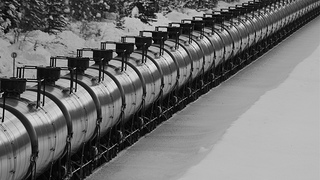UPDATE: What a coincidence: Underlining the relavence of regulations, an oil train derailed early this morning underneath the Magnolia Bridge. No spills and no injuries, according to reports.
While the fight over coal trains has been raging for years, the newer phenomenon of oil trains has attracted less attention. But the issue is now exploding–as are the train cars themselves. “There have been five explosions in the last 13 months, including one that killed 47 people in Quebec,” notes Sightline policy director Eric de Place, who has been writing about the issue. Many of the tank cars are old, and when they derail, oil can spill and ignite.
That’s got a lot of people worried, including in Seattle, where oil trains now pass through on their way from the Bakken fracking region in North Dakota to refineries in Anacortes and Ferndale. The route takes the trains through SoDO, into a tunnel across downtown and up to the waterfront by Myrtle Edward Park, according to de Place.
Responding to nationwide concerns, the U.S. Department of Transportation today released proposed rules aimed at replacing the older tank cars within two years, reducing operating speeds, strengthening breaking systems and creating other standards. “Safety is our top priority,” declared Transportation Secretary Anthony Foxx.
But City Council members, who several months back passed a resolution urging the phase-out of older “DOT-111” cars, weren’t assuaged. They released a letter, signed by all nine members, that calls for an emergency order stopping the shipment of oil in such cars.
“We understand that a final rule on the new federal tank car requirements may not be fully in place for year or more,” reads the letter, dated July 21. “In the meantime, huge volumes of explosive crude oil continue to travel through our communities in unsafe rail cars…We therefore seek to protect the public from oil spills and explosions now.”
A press release calls the letter the “first nationwide action by a city council” to call for such an immediate action.
“The City Council is doing exactly the right thing,” says de Place, who says he is not only concerned by the drawn out process but also by what he calls “quite a bit of wiggle room” in the proposed regulations. Indeed, the Wall Street Journal
reports that the proposed changes “aren’t as stringent as some in the rail and energy industries feared.”
It’s also unclear whether the changes, if enacted, would substantially slow down the volume of oil traveling through our region. Thanks to fracking, oil is a growth industry, and local refineries are building up their infrastructure to handle the inflow. According to the city council letter, “the volume of petroleum-by-rail moving through Seattle is expected to triple to over one million barrels per week over the next few years.”
Photo licensed by Creative Commons.








